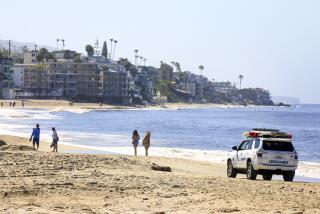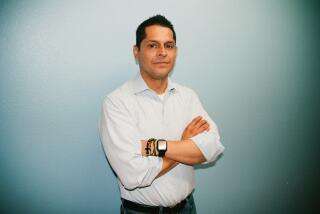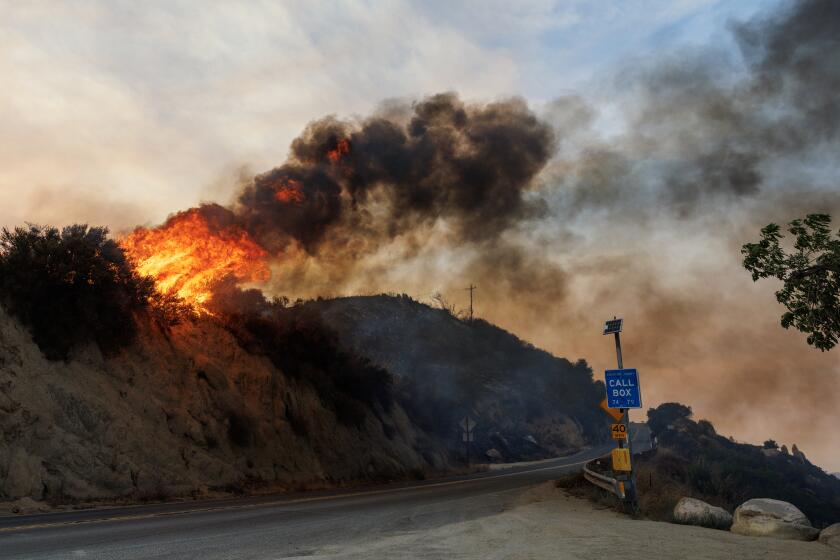Racial slurs, anti-gay epithets, the N-word and F-bombs: Why L.A. political discourse is plummeting
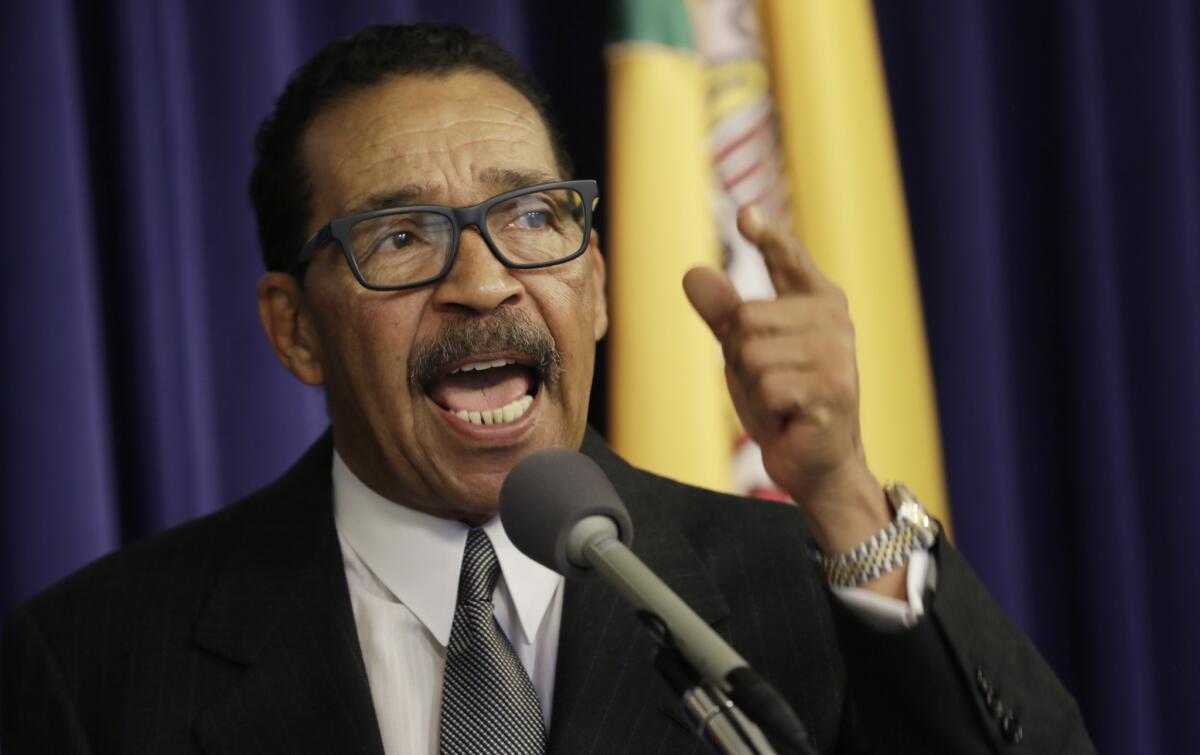
Racial slurs. Anti-gay epithets. The N-word. The F-bomb.
Over the last three years, the language used by members of the public at Los Angeles City Council meetings has grown increasingly graphic, moving from the vulgar and the sexually explicit into the hateful and, some say, frightening.
But worries over those messages crossed a new threshold in recent days, after Los Angeles City Council President Herb Wesson received a public comment card featuring a racial epithet and a drawing of a burning cross. The card, submitted by Encino attorney Wayne Spindler, also featured a drawing of a figure resembling a Ku Klux Klansman and a man hanging from a tree.
Spindler was arrested May 13 and booked on a felony count of making a criminal threat. Now, some council members said they are looking for new ways of reining in what they describe as hateful and offensive language during public meetings.
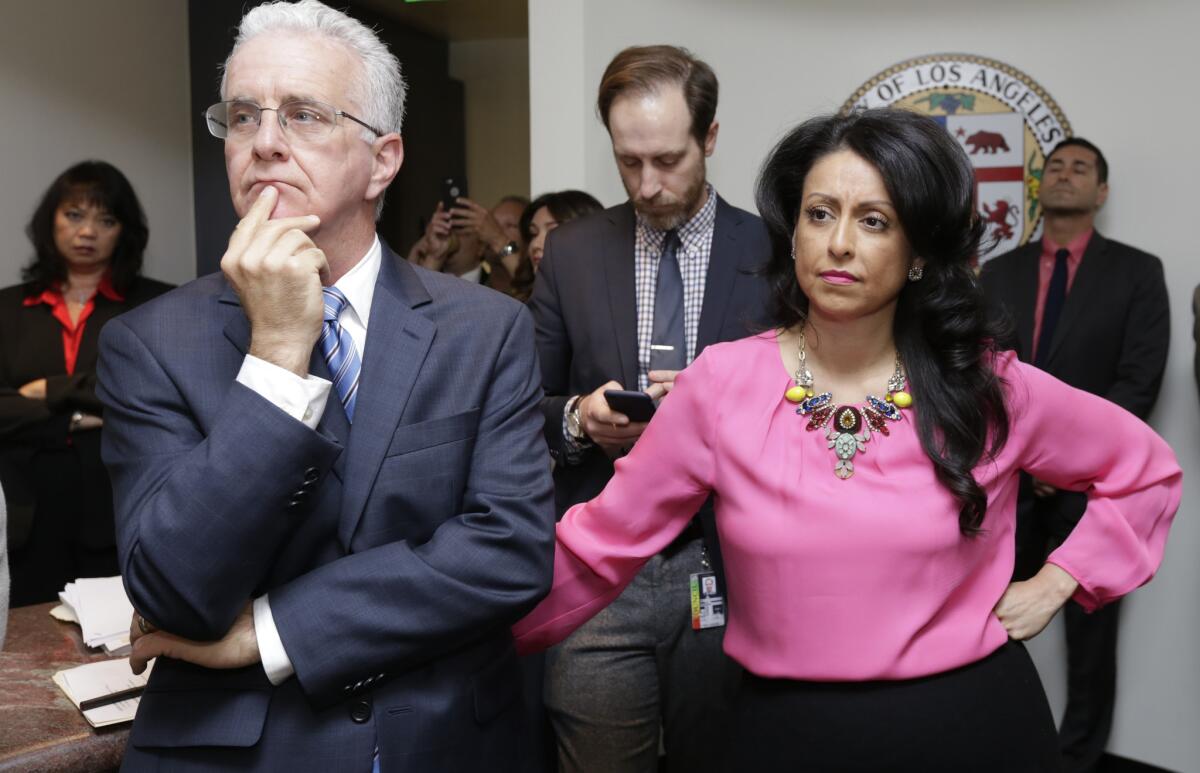
“Over the last 2 1/2 years that I’ve been here, it’s escalated,” said Councilwoman Nury Martinez, who represents the San Fernando Valley. “And it’s gotten scarier and scarier to come to work.”
Wesson, the council’s first black president, made clear he views the comment card as a potential threat to his family, the city’s workforce and visitors to City Hall.
For Wesson, the comment card rekindled memories of stories told by his grandparents, who lived in Arkansas and Georgia, about “liquored-up Klansmen running through the South terrorizing black people, about crosses actually being burned on the lawns of their friends.”
“It is not OK to do that to me,” he said at a City Hall news conference. “It is not OK to do that to us in the year 2016. And when I’m talking about us, I’m talking about all of us -- white, yellow, black and brown.”
Spindler, in turn, denied that he had made a threat and instead accused Wesson and his colleagues of “trying to chill free speech.” In an interview, the Encino resident compared his work to Charlie Hebdo, the controversial French cartoon publication. He also said he is “absolutely” not a KKK member.
The burning cross on the card, Spindler said, was meant to show that City Hall is “burning down with corruption.” The drawing of the person hanging from a tree is a reference to rate increases recently approved by the Department of Water and Power, he said.
“We’re getting lynched with a 20% rate hike” Spindler added.
Prosecutors are evaluating whether to file charges against Spindler, said Jane Robison, spokeswoman for the L.A. County district attorney’s office.
Council members say Spindler, who sometimes refers to himself as “Wayne from Encino,” has a long history of outrageous behavior. He has repeatedly worn a Ku Klux Klan hood with a swastika on it. From the audience, he has offered council members a Nazi salute.
Another frequent public speaker routinely uses a slur against Mexican immigrants when appearing before the council. A third called council members a derogatory word for gay men during an appearance last month.
Yet even as they decried the use of inflammatory language, council members acknowledged they have a limited ability to control what is said during public meetings. Federal courts have ruled that public speakers can be ejected if they become so disruptive that they impair the council’s ability to run the meeting. They cannot, however, be removed simply for uttering curse words or hateful invective.
That was the message in 2013 from a federal judge, siding with City Hall critics who had been ejected from meetings after using the F-word during public comment. U.S. District Judge Dean D. Pregerson said that under the 1st Amendment, council members must be willing to tolerate obscene language and personal attacks.
“In one of the largest cities in the world, it is to be expected that some inhabitants will sometimes use language that does not conform to conventions of civility and decorum, including offensive language and swear words,” Pregerson wrote.
A year later, the city paid $215,000 to settle a case filed by a Venice resident who sued after being ejected from a city commission meeting. The man, who is black, had worn a Ku Klux Klan hood and a T-shirt featuring a racial slur against African Americans.
When that case was finalized, the use of incendiary language by the public “took a dramatic turn for the worse,” said Councilman Paul Krekorian.
Krekorian said he believes there are additional steps the city can take to limit disruptive behavior during council meetings. He declined to spell out what those steps could be.
“When someone ... makes racist threats, makes foul, sexist comments, makes homophobic, pornographic comments from our microphone, children in Los Angeles are seeing that across our city,” he said. “People are feeling victimized by that across our city. People are feeling threatened by those comments across our city.”
But Stephen Rohde, who represented the City Hall critics in both lawsuits, argued that it would be a mistake for council members to approve new “speech restrictions” and then try to defend them in court.
“This is the rough and tumble of democracy,” he said. “And these City Council persons need to respect the constitution, respect the court rulings, take this stuff in stride and focus on the merits of whatever issues are being debated.”
Spindler submitted his speaker card at the May 11 meeting of the Rules, Elections, Intergovernmental Relations and Neighborhoods Committee. Wesson is chairman of the committee.
The card was scanned by the City Clerk’s office and published online with other public comment cards from the meeting. In blue marker, the card appears to depict a Ku Klux Klan figure holding a sign that states, “Herb = [N-word].” The image of a body dangling from a tree by a noose is evocative of the lynching of blacks in the 19th and 20th centuries.
Rohde, the civil liberties attorney, contends that Spindler’s drawing “is squarely in the category of protected speech” and does not constitute a threat to public safety.
Anne-Marie Johnson, who serves on the Silver Lake Neighborhood Council, disagreed with that interpretation, saying the card is definitely a threat. And she argued that council members had done too little to rein in offensive speech.
Johnson, who is African American, said legal worries were “a lame excuse” for allowing such speech to continue on the council floor. “I’m a little tired of the city being afraid to take things to court because they’ve lost,” she added. “Maybe they need better attorneys.”
Martinez said she too wants the city to push back. Such language was not tolerated, Martinez said, during her time on the Los Angeles school board and the San Fernando City Council.
At City Hall, people who use slurs and inflammatory language have been reassured by federal judges that “they can continue to behave this way,” she said.
“We always seem to sort up throw our hands up in the air and give up,” Martinez added. “Now you’ve seen the results.”
[email protected] | Twitter: @MattHjourno
[email protected] | Twitter: @LATimesemily
[email protected] | Twitter: @davidzahniser
Times staff writers Kate Mather and Abby Sewell contributed to this report.
ALSO
Key construction deadline for California bullet train pushed back four years
The dark side of trendy food trucks: A poor health safety record
Southern California Gas Co. fined $2.25 million for pipeline safety violations
UPDATES:
3:59 p.m.: This article has been updated throughout with more information.
11:10 a.m.: This article has been updated with comments from Wesson at the news conference.
9:45 a.m.: This article has been updated with a statement from the district attorney’s office.
7:50 a.m. May 19: This article has been updated to note that Wesson plans to address the attacks Thursday.
This article was originally published at 9:32 p.m. May 18.
More to Read
Sign up for Essential California
The most important California stories and recommendations in your inbox every morning.
You may occasionally receive promotional content from the Los Angeles Times.

